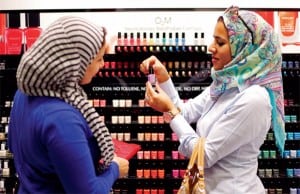Dubai revs up drive to become the centre of Islamic economy
From cosmetics to accommodation, travel to toothpaste, complying with religious principles is becoming big business in the Muslim world, and Dubai sees an opportunity.

The emirate is mounting the world’s first systematic drive to profit from halal goods and services by setting global standards for them and providing certification where the standards are met.
In January, His Highness Sheikh Mohammed bin Rashid Al Maktoum, Vice-President and Prime Minister of the UAE and Ruler of Dubai, announced plans to make the emirate a centre of the Islamic economy. Next week, Dubai will host a conference on the subject that it is expected to attract over 2,000 officials, businessmen and consumers from around the world.
It might sound like a hard sell, but the emirate, already the Gulf’s top financial centre and a merchandise trade hub, may have the business acumen and international connections to pull it off.
In fact, it may succeed precisely because of its cosmopolitan culture; Dubai may be best-placed to take a middle path acceptable to most of the world’s 1.6 billion Muslims.
“Dubai’s economy hinges on its maintenance of coexistence among faiths,” said Jim Krane, a fellow at Rice University’s Baker Institute for Public Policy in the United States, and author of City of Gold: Dubai and the Dream of Capitalism.
“That makes Dubai an ideal testing ground for halal standards. If halal standards are too restrictive and impinge on social freedoms, they might hurt business.”
A decade ago the term “halal”, an Arabic word meaning “permissible”, was applied mostly to the food eaten by Muslims. Increasingly, it is also being used to describe a range of products and services, including high fashion, toiletries, medicine, hotels and tourism, entertainment and education.
Halal toothpaste and medical products do not include alcohol or animal derivatives from banned sources, such as pigs, or cattle slaughtered in an improper way. Halal fashion means clothes that are both modest and trendy.
For women crowded round a counter in a glitzy Dubai mall, one nail varnish had the appeal of being “breathable”, letting moisture and oxygen pass through, so the wearer could properly wash as required before prayers.
“I’ve been waiting for such a product for so long,” said Mai Elsakhawy, an Egyptian resident of Dubai in her early 30s. “I can now wear my nail polish without violating my religious beliefs and affecting my prayers.”
Some of the growing emphasis on halal products may be due to increased piety in parts of the Muslim world. For some people it has become a consumer trend, encouraged by companies advertising new products to stimulate demand.
Nobody knows how much of the Muslim world’s spending will become halal, but a report to be released next week by Thomson Reuters and DinarStandard, a New York advisory firm that focuses on emerging Muslim markets, estimates Muslim consumer spending on food and lifestyles totalled $1.62 trillion in 2012.
“The real development that is happening now, and which is the big opportunity, is that halal is now a lifestyle segment,” said Rafi-uddin Shikoh, chief executive of DinarStandard.
“The underlying business proposition is a large customer segment that is increasingly making purchasing decisions that include, among other attributes, Islamic principles,” Shikoh added.


